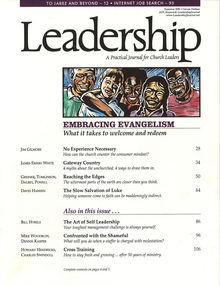As I watched my friend being ordained, and thirty pastors gather around and lay hands upon one head, I felt a surge of joy—and a simultaneous sinking awareness that my friend, though gifted, would not find ministry easy. This newly commissioned pastor had been sent to a church of 14 to apply cardiac paddles to a patient that had flat-lined. As in the E.R., the procedure was risky and the outcome unknown.
When I visited my friend’s new church, the pianist hired for the previous week had not worked out, so the service went on without any music. The nursery worker didn’t show up and didn’t tell anyone she wasn’t coming. Bags with fresh loaves of bread sticking out waited to be passed out to visitors, but few loaves would be given out that day. Welcome to ministry.
Exiled to a rocky, barren isle, John wrote to Christians: “In Jesus we are partners in suffering and in the Kingdom and in patient endurance.” We prefer to hear that we are the salt of the earth and the light of the world, not “partners in patient endurance.” But Christianity in general and ministry in particular is a marathon. When pain knifes your side and sweat stings your eyes, you have to keep running.
Fifteen years ago I wrote Secrets of Staying Power, which drew on national research to answer, “What discourages pastors most—and how can those things be overcome?” I grouped the answers into five “cries”:
1. “I can’t see any progress.” This caused Martin Luther to become deeply discouraged with his congregation. Despite all his preaching, his people remained godless, he felt. In 1530, Luther actually went on strike and refused to preach for a time.
2. “I’m not able to use my gifts.” Usually, preaching and giving spiritual guidance are trumped by administrative duties.
3. “I’m facing a few difficult members.” One insurance agent learned in his training the “Rule of the 5 Percent.” No matter what you do, it says, 5 percent of your clients aren’t going to be happy. The same usually holds true in the church.
4. “I need affirmation for what I do.” Often in pastoral ministry, few people truly understand the nature of your work or observe it closely enough to comment accurately. Thus, you may hear (a) nothing, (b) criticism, or (c) warm but perhaps uninformed affirmation.
5. “I need rest and refreshment.” As Tim Hansel once quipped of his long days in ministry, “I spent more time promoting living than I did living.”
Given these challenges, a great achievement for any pastor is to demonstrate “patient endurance.” You win just by showing up.
You win by refusing to listen to the inner voice that whispers, “You’ve got talent. Leave and show you’re better than this.”
You win by restraining the yearning for excitement, visible change, and growth. It’s good to want accomplishment for Jesus Christ, but often (when I’m honest) what I want is more the excitement and achievement than Christ. For Jesus has this odd way of hiding himself among ordinary duties and ornery people.
Each day in ministry is a new opportunity to be a partner in the fine art of patient endurance. Oswald Chambers explained that “The test of a man’s religious life and character is not what he does in the exceptional moments of life, but what he does in the ordinary times, when there is nothing tremendous or exciting on. … Don’t give in because the pain is bad just now; get on with it, and before long you will find you have a new vision and a new purpose.”
Kevin A. Miller is editor-at-large of Leadership.
Tyranny of the “Ought”
Are you guilting yourself into overwork? Paula RinehartMy husband and I were discussing the pressures that clogged our lives—mostly good things, but too many and too much. What kept me pushing so hard, so long?
I finally posed the question, “Why does God make it so hard to serve Him?”
I realized I was living by “the tyranny of the oughts.” You ought to do more. You ought to do better. There might be 30 things wrong with you, but with God’s help and enough effort, someday you might be “fixed.”
A major turning point came when I realized that this “inner critic” was not the voice of God. I was hearing an echo of myself and my longing to be loved and affirmed. I tricked myself into believing that doing enough to merit God’s approval would be the ultimate silencer of my thoughts of unworthiness. The emotional logic behind a lifestyle of personal effort is that someday, if I work hard enough, I will be received with open arms and a big smile.
I discovered that the compulsive pace of my life mirrored the beliefs of my heart, however erroneous. Despite knowing better, what I really believed was that my effort could wrest from God a love and acceptance based on performance.
I could not receive His grace until I stepped off the treadmill and waited with empty hands. I could not hear his voice—strong, inviting, and steady—
until I could separate Him from the nagging critic I carried inside me, until I disconnected my longing to be loved from my efforts to please.
Solitary Refinement
from Paula Reinhart’s article “Good Enough!” in Discipleship Journal;the full article is available at www.theooze.com.
Insights
The great joy of the solitary life is not found simply in quiet, in the beauty and peace of nature, songs of birds, etc., nor in the peace of one’s own heart, but in the awakening and attuning of the heart to the voice of God—to the inexplicable, quiet, definite inner certitude of one’s call to obey Him, to hear Him, to worship Him here, now, today, in silence and alone, and that this is the whole reason for one’s existence. This makes one’s existence fruitful and gives fruitfulness to all one’s other (good) acts and is the ransom and purification of one’s heart, which has been dead in sin.—Thomas Merton, The Intimate Merton
True Cause and Effect
It is atonement that makes repentance, not repentance that makes atonement.—P.T. Forsyth, The Holy Father and the Living Christ
Better Reception
Receptivity is not a single thing; it is a compound rather, a blending of several elements within the soul. It is an affinity for, a bent toward. … It may be increased by exercise or destroyed by neglect. It is not a sovereign and irresistible force which comes upon us as a seizure from above. It is a gift of God, indeed, but one which must be recognized and cultivated as any other gift.—A.W. Tozer, The Pursuit of God
Copyright © 2001 by the author or Christianity Today/Leadership journal. Click here for reprint information on Leadership.








